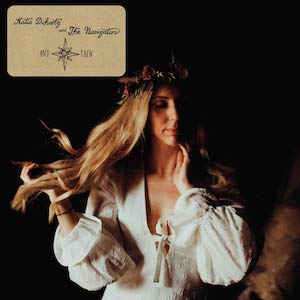 Katie Doherty & The Navigators – And Then
Katie Doherty & The Navigators – And Then
Steeplejack – 25 January 2019
Ten years ago, Teeside’s folk singer-songwriter Katie Doherty was named Newcomer of the Year by a Newcastle newspaper and released her debut album, Bridges, going on to share stages with Karine Polwart, the McGarrigles and Ray Davies. However, taking on the role of a musical director for the RSC and composer for several Northern Stage productions, not to mention marriage and a baby, meant that plans for a second album were put on the back burner.
They have, however, finally come to the boil, simmering in themes of change, be that of the seasons, time, social attitudes or circumstances, and the sometimes difficulty in keeping up. Working with fellow Newcastle graduates and award-winners Shona Mooney on fiddle and Dave Gray on melodeon as well as Ian Stephenson on double bass and a smattering of other musicians on individual tracks, Doherty accompanies herself on piano and sansula (a thumb piano of the kalimba family), the album opens with the melodeon-wheezing I’ll Go Out, a song about outrunning the pain and reconnecting with life.
Backdropped by pulsing fiddle, Yours is a simple declaration of love to her farmer husband veined with not feeling worthy (“You deserve more than my temporary smile”), moving on to another effusive love song, Doherty adopting an almost little girl-like vocal, with the soaring, plucked-fiddle Navigator, Mark Carroll on cello with Andrew Cadie and Mark Bloomer offering fulsome backing vocals.
Shifting from personal perspectives, Heartbeat Ballroom was written as a commission to mark the reopening of the Wallsend Memorial Hall’s ballroom and, cello and melodeon weaving in and out, adopts a piano waltzing sepia tone of nostalgia as the female narrator recalls how she and her latch top kid teenage boyfriend, she in high heels, he in his dad’s shoes, “danced into each other’s hearts and wrote our names on the floor with our feet.”
Evoking Shakespeare’s melancholic pastoral songs, the sparsely arranged, traditional-sounding A Rose in Winter also travels a non-autobiographical path as she sings of the coming of the winter snows and the fading of the rose with its frozen petals, though the song can also obviously be seen as a meditation on mortality.
A traditional instrumental featuring fiddle and melodeon, the Eastern European tones of Polska provide a bridge into the second half, Doherty vocalising as she soars over the instrumentation midway before the musical blood rises to the finale.
Opening with needling fiddle, the melodically nervy, staccato shaped Angry Daughter, the album’s most urgent number, strikes a note of social protest as, conjuring thoughts of Thea Gilmore, she sings of resilience in the face of inequality, declaring “this is not war music, this is not a fighting song/ This is owed to resilience. Stand up for what is wrong/For the ones who turn and face it/For the ones that silence broke.”
Although, cast as a piano ballad once past Gray’s furrowed brow melodeon, that defiance and anger continues to stoke the musical flames with the title track which addresses societal pressures in the social media era, of the dangers of getting lost in the pursuit of fitting in “when you can feel tomorrow coming at you like a force nine gale” and how “that fire in your belly is a safety hazard and they’ll smother it before it could begin.”
Perhaps inevitably, musing on the nature of the modern world turns her thoughts back to family with the piano accompanied Tiny Little Shoes, the longest track, an airy, melodeon-wheezing reflection on motherhood and what the future may hold (“Take a little time, find your own space…who knows where your feet will land”), the soaring refrain (“we will sing your heart out”) a pledge of parental love and support
Anchored by a simple plucked fiddle joined by melodeon, it ends with the folksiest track, We Burn, an anthem of community brought together in grief and love, a celebration of the coming of summer with its new life and new hopes as, joined by the massed voices of the cast from Beyond The End Of The Road, the rural musical for which she composed the sore, she exults “So join in our almighty sound and raise your heads up from the ground” before the track ebbs away again on Mooney’s plucked strings. “Here’s where we begin to grow”, she sings on Angry Daughter. Hers is an ascent well worth following. And then some.
https://www.katiedoherty.co.uk/
